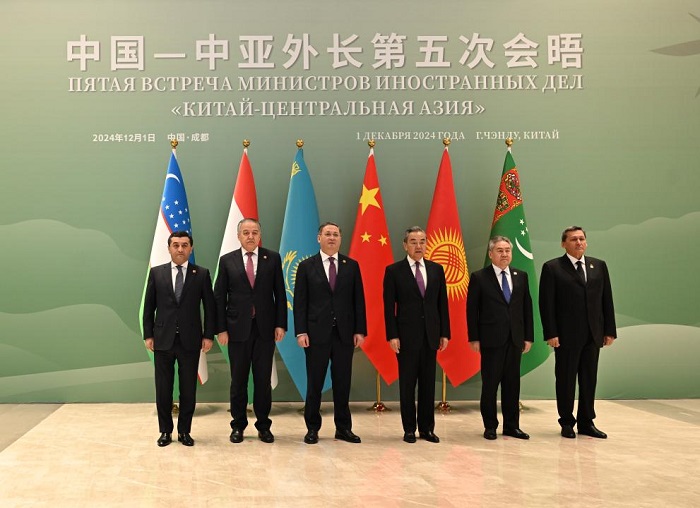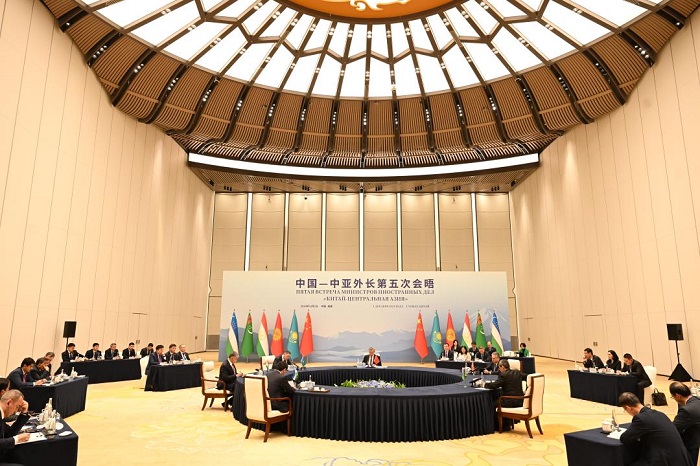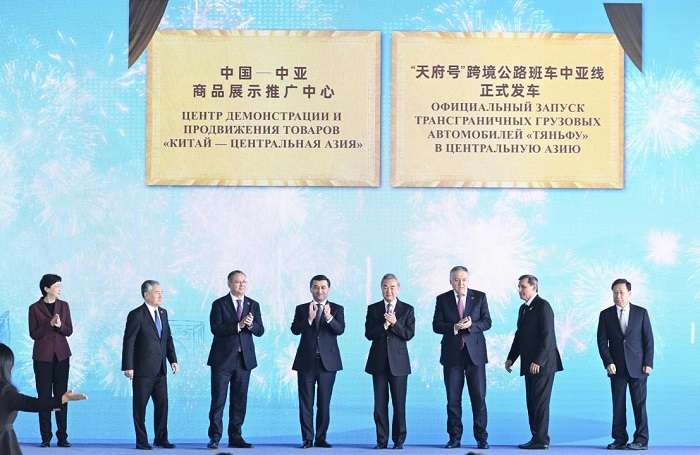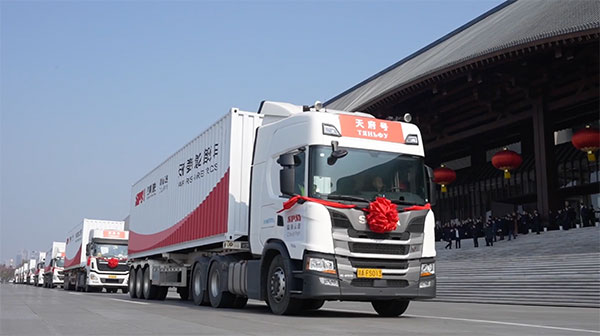On 1 December 2024, the fifth meeting of the Foreign Ministers of China and Central Asian countries took place in Chengdu.
 The meeting, which was chaired by Foreign Minister of China Wang Yi, was attended by:
The meeting, which was chaired by Foreign Minister of China Wang Yi, was attended by:
• Kazakhstan – Deputy Prime Minister, Minister of Foreign Affairs Murat Nurtleu.
• Kyrgyzstan – Minister of Foreign Affairs Jeenbek Kulubayev
• Tajikistan – Minister of Foreign Affairs Sirodjiddin Mukhriddin
• Turkmenistan – Deputy Prime Minister, Minister of Foreign Affairs Rashid Meredov
• Uzbekistan – Minister of Foreign Affairs Bakhtiyor Saidov.
The ministers reviewed the outcomes of the first China-Central Asia Summit and held in-depth discussions on launching preparations for the second summit to be held in Kazakhstan next year.
According to the Ministry of Foreign Affairs of China, after the meeting, Wang Yi, together with the foreign ministers of the five countries, met with reporters to summarize the outcomes and consensus of the meeting.
 Preparations for the second China-Central Asia Summit: The parties agreed to promote greater development of cooperation between China and Central Asia. They will fully support Kazakhstan in successfully hosting the summit next year. The work will be commenced for preparation of the summit joint declaration, the action plan for high-quality Belt and Road Initiative cooperation, an agreement on eternal good neighborliness, friendship and cooperation between the member states of the China-Central Asia format, as well as others important documents on cooperation in various fields.
Preparations for the second China-Central Asia Summit: The parties agreed to promote greater development of cooperation between China and Central Asia. They will fully support Kazakhstan in successfully hosting the summit next year. The work will be commenced for preparation of the summit joint declaration, the action plan for high-quality Belt and Road Initiative cooperation, an agreement on eternal good neighborliness, friendship and cooperation between the member states of the China-Central Asia format, as well as others important documents on cooperation in various fields.
Priority areas of cooperation: The parties will steadily pursue the goal of deepening comprehensive cooperation. Coordination of development strategies will continue. In particular, the parties intend to promote six areas of cooperation as a matter of priority: trade facilitation, industrial investment, connectivity, environmentally friendly minerals, modernization of agriculture and facilitation of people-to-people exchanges. China is willing to expand cooperation with Central Asian countries in such fields as the application of the Beidou navigation satellite system, poverty reduction and alleviation, desertification control, higher education, and humanitarian relations.
Miniating regional peace and security: The parties will adhere to the principle of common security and protect peace and tranquility in the region. The Global Security Initiative will be actively implemented, the parties will jointly fight against the “three forces of evil”, resolutely oppose external interference in the internal affairs of Central Asian countries, standing against the creation of chaos and instability in Central Asia, and assisting Afghanistan in achieving peace and reconstruction as soon as possible.
Education and friendship between peoples: The parties will adhere to the principle of mutual enrichment of civilizations and strengthen the foundation of friendship between generations. The exchange of public administration experience will be strengthened, the construction of cultural centers and the creation of Luban workshops will be accelerated, and cooperation in the field of education, healthcare and professional training will be constantly expanded.
Over the next three years, China will provide 1,500 training opoortunities for five Central Asian countries and increase the number of scholarships by 600.
Multilateralism: The parties will adhere to the principle of multilateralism and defend international justice. Coordination and cooperation in international and regional issues will continue to be strengthened. The parties will resist any form of “disconnection and severance of ties”, will strive for a multipolar world based on equality and order, and inclusive economic globalization. All parties will fully support China as the rotating chair of the Shanghai Cooperation Organization and jointly promote new development and new progress of the SCO.
The final document of the meeting was a Joint Statement adopted by the heads of foreign ministries, which reflected the agreements reached and outlined a course for further development of interregional cooperation.
The parties agreed to hold the next meeting of the Central Asia–China format in 2025 in Kazakhstan on the eve of the Summit.
***
On the sidelines of the meeting, the ministers took part in the ceremony of sending the 5,000th truck along the Tianfu-Sichuan cross–border highway and the 500th train to Central Asia.
 10 trucks, fully loaded with renewable energy equipment and other goods produced in Sichuan, set off from the Tianfu new area of Chengdu to the countries of Central Asia.
10 trucks, fully loaded with renewable energy equipment and other goods produced in Sichuan, set off from the Tianfu new area of Chengdu to the countries of Central Asia.
 The Foreign Ministers of the six countries also held the opening ceremony of the “China-Central Asia Goods Demonstration and Promotion Center”. The center will house national exhibition halls of five Central Asian countries to showcase and promote products, which will create a new platform for linking resources and cooperation in trade, science and education, culture and tourism between China and Central Asia. ///nCa, 2 December 2024
The Foreign Ministers of the six countries also held the opening ceremony of the “China-Central Asia Goods Demonstration and Promotion Center”. The center will house national exhibition halls of five Central Asian countries to showcase and promote products, which will create a new platform for linking resources and cooperation in trade, science and education, culture and tourism between China and Central Asia. ///nCa, 2 December 2024